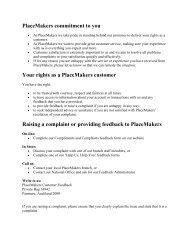what we learned from christchurch taking the risk out ... - PlaceMakers
what we learned from christchurch taking the risk out ... - PlaceMakers
what we learned from christchurch taking the risk out ... - PlaceMakers
You also want an ePaper? Increase the reach of your titles
YUMPU automatically turns print PDFs into web optimized ePapers that Google loves.
FEATURESLEGALGetting your hands on your money (Part 3)Details on proposed changes to <strong>the</strong> Construction Contracts Act and how it could affect you and your businessIn <strong>the</strong> previous two editions ofUnder Construction, <strong>we</strong> lookedat <strong>the</strong> Construction ContractsAct 2002 (Act), focusing on:a) How <strong>the</strong> Act may prove useful inhelping you get paid.b) The options available to youunder <strong>the</strong> Act to enforce paymentsdue to you, including <strong>the</strong> suspensionof work.In this month’s edition <strong>we</strong> look at<strong>the</strong> proposed changes to <strong>the</strong> Act, <strong>the</strong>reasons for <strong>the</strong>m and <strong>what</strong> it mightmean for you in your business.BACKGROUNDWhen <strong>the</strong> Act originally came intoforce in April 2003, it reformed <strong>the</strong>law relating to construction contractsand changed <strong>the</strong> face of disputeresolution in <strong>the</strong> New Zealandconstruction industry. Following itsintroduction, <strong>the</strong> Act generally appliedto every construction contract enteredinto after 1 April 2003, whe<strong>the</strong>r ornot governed by NZ law and whe<strong>the</strong>r<strong>the</strong> construction contract was written,oral, or partly written and partly oral.The Act also introduced provisionsreforming <strong>the</strong> law relating to constructioncontracts. In particular, it aimed to:a) Facilitate regular and timelypayments bet<strong>we</strong>en <strong>the</strong> parties toconstruction contracts.b) Provide for <strong>the</strong> speedy resolution ofdisputes arising under a constructioncontract.c) Provide remedies for <strong>the</strong> recoveryof payments under a constructioncontract.Ho<strong>we</strong>ver, a number of practicalissues have since arisen with <strong>the</strong>Act and <strong>the</strong> way it operates, or isapplied, on a day-to-day basis.22In particular, <strong>the</strong>re have beencomplaints around:a) The distinction drawn in <strong>the</strong> Actbet<strong>we</strong>en residential and commercialwww.simpsongrierson.comwww.bcito.org.nzThe proposed changes to <strong>the</strong> Act would clarify and shorten <strong>the</strong> timeframes that will apply once <strong>the</strong> dispute resolutionprocess starts, meaning less time wastedconstruction contracts (The Act sets<strong>out</strong> different procedures dependingon whe<strong>the</strong>r <strong>the</strong> construction contractis a residential or a commercialconstruction contract).b) Difficulties in enforcing determinationsunder <strong>the</strong> Act due to time and costbarriers.c) The fact that <strong>the</strong> Act only applies tophysical construction work, <strong>the</strong>rebypotentially excluding professionalservice providers, such as architectsand engineers, <strong>from</strong> its disputeresolution processes.CHANGES PROPOSEDThe Government is currently proposingto amend <strong>the</strong> Act (via <strong>the</strong> introductionof a Construction Contracts AmendmentBill) in order to:a) Improve <strong>the</strong> application of <strong>the</strong> Actto everyday situations.Publication delayedPublication of <strong>the</strong> revised NZS3910 Conditions of Contract forbuilding and engineering is no<strong>we</strong>xpected in mid-2013 due to alarge amount of public feedbackduring <strong>the</strong> comment period.Standards New Zealand issueda draft edition of <strong>the</strong> revised NZS3910 in September 2012, andinvited public comment for a periodof two months, during which morethan 1000 comments <strong>we</strong>re received.Based on <strong>the</strong> feedback <strong>from</strong> <strong>the</strong>sector, three standards will bepublished in place of one. Separatestandards will relate to construction,design and construction and termmaintenance.More information is available atstandards.co.nzN
















